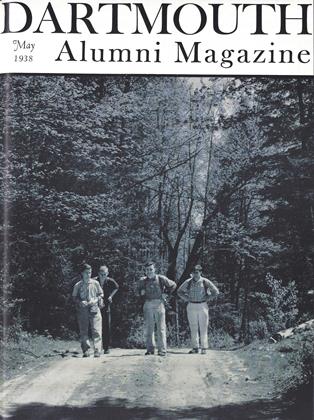by E. Wilder Spaulding '22. The Macmillan Company, New York, 1938- 325 PP- $3-50.
What with so many of our novelists turning historians and coating the bitter facts with the sugar of a lively style and a stirring story of adventure our more sedate historians are often made to appear as dryas-dust factualists. Walter Edmonds and Kenneth Roberts and the rest of that group have placed even the serious writers of history much in their debt and set an example which members of the historical profession ought more often to emulate. But these historical novelists have to some extent spoiled our appetite for the heavier fare which sometimes seems unavoidable.
The subject of this biography, Governor George Clinton, though he played a prominent part in the American Revolution and the turbulent years which followed, is yet a far cry from Captain Robert Rogers. Both are interesting and significant as types but the brave and blustering captain makes a much better story than the heavy and substantial anti-federalist who served as governor of New York for twenty-one years and vice president of the United States for seven years and yet for over a century thereafter remained to a surprising degree a political nonentity. As an officer in the Revolution he enjoyed the close friendship and confidence of General Washington and rendered invaluable service in the critical arena of the Hudson Valley yet his military record is not distinguished by the thrilling or the spectacular. From this account it would appear that George Bancroft could never have remarked of Clinton, as he did of Clay, that "neither in public nor in private did he know how to be dull."
This is not to say, however, that the life story of General Clinton, which has waited so long for its telling, does not merit the solid and thorough piece of work which Dr. Spaulding has done. As one of the most prominent leaders of Northern antiFederalism Clinton deserved a full-length biography, though the value of the book turns out to be not as much in the portrait of the individual as in the new lines and shadings which it gives to the general picture of the time. It furnishes a valuable insight into the intricacies of New York politics during the Revolution and the bitter controversies of the quarter century which followed. It contributes to a fuller understanding of the opposition to the adoption of the federal Constitution and reveals in General Clinton's dull but important "Cato" letters the provocation of "The Federalist" letters of Hamilton, Madison, and Jay. It shows in new perspective the importance of the public land question and suggests an interesting connection between Clinton's New York titles in the Vermont area and his stubborn opposition to any recognition of Vermont's separatist tendencies. It reveals a Clinton who was honest, blunt, courageous, a sound and shrewd financial manager and a sincere protagonist of the common man and the democratic theory, yet a man of mediocre mental capacity, somewhat dull and ponderous, led by his own economic interests to a conservative position on property-rights and by his own political aspirations to a thorough-going particularism in government.
This is not a book which will'appeal to the general reader. For the student of the period it is a valuable account.
 View Full Issue
View Full Issue
More From This Issue
-
 Article
ArticleDartmouth in the Dictionary of American Biography
May 1938 By WILLIAM A. ROBINSON -
 Article
ArticleGradus Ad Parnassum
May 1938 -
 Sports
SportsFollowing the Big Green Teams
May 1938 By Bob Haslam '39 -
 Article
ArticleFive Decades of Engineering
May 1938 By MILBURN MCCARTY JR. '35 -
 Class Notes
Class NotesClass of 1918
May 1938 By Allan C. Gottschaldt -
 Class Notes
Class NotesClass of 1910
May 1938 By Hap Hinman
Allen R. Foley '20
-
 Article
ArticleHANOVER'S EARLY BIRDS
December 1961 By ALLEN R. FOLEY '20 -
 Article
ArticleTHE HANOVER POST OFFICE
JANUARY 1963 By ALLEN R. FOLEY '20 -
 Books
BooksTHE MOUNTAIN MEN.
MARCH 1964 By ALLEN R. FOLEY '20 -
 Article
ArticlePOPULATION AND POLITICS
MARCH 1964 By ALLEN R. FOLEY '20 -
 Article
ArticleTOWN AND GOWN
JANUARY 1965 By ALLEN R. FOLEY '20 -
 Books
BooksTHE VOYAGES OF BRIAN SEAWORTHY: AN HISTORICAL ADVENTURE ON LAKE CHAMPLAIN.
NOVEMBER 1971 By ALLEN R. FOLEY '20
Books
-
 Books
BooksAlumni Articles
DECEMBER 1971 -
 Books
BooksPLASMAS – LABORATORY AND COSMIC
MAY 1966 By AGNAR PYTTE -
 Books
BooksTHE TRAGIC ERA
January, 1930 By Charles L. Lingley -
 Books
BooksTHE GRAND MADEMOISELLE.
April 1956 By JOHN R. WILLIAMS -
 Books
BooksTHE POLITICS OF DISTRIBUTION.
June 1956 By LAURENCE I. RADWAY -
 Books
BooksWINNERS
November 1933 By William A. Eddy

